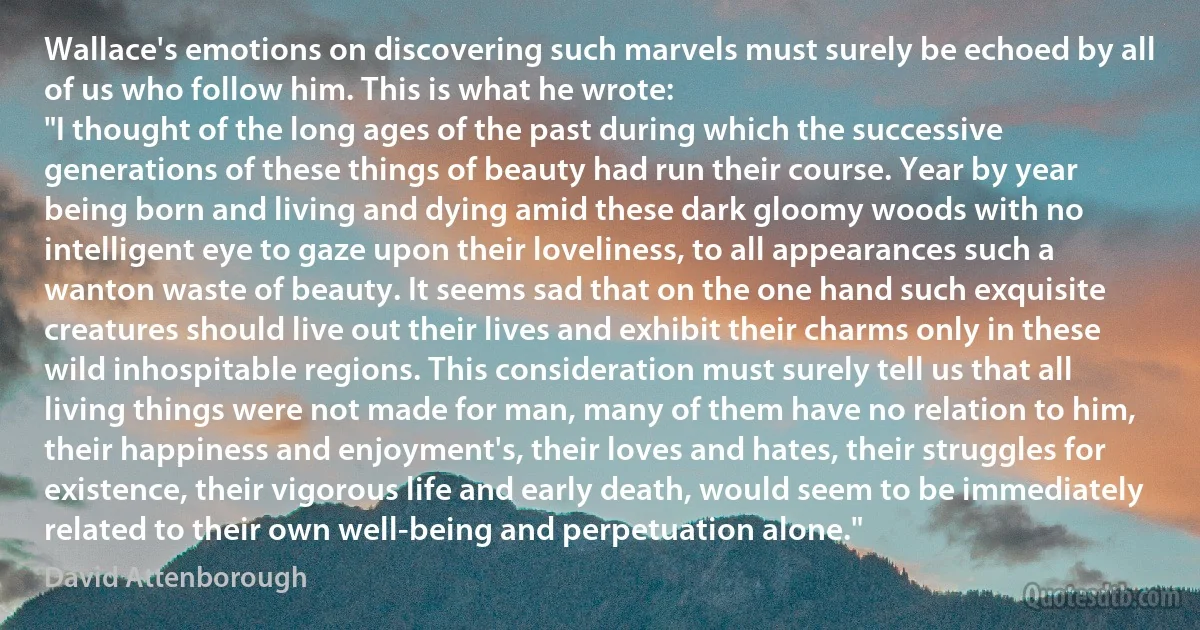
Wallace's emotions on discovering such marvels must surely be echoed by all of us who follow him. This is what he wrote: "I thought of the long ages of the past during which the successive generations of these things of beauty had run their course. Year by year being born and living and dying amid these dark gloomy woods with no intelligent eye to gaze upon their loveliness, to all appearances such a wanton waste of beauty. It seems sad that on the one hand such exquisite creatures should live out their lives and exhibit their charms only in these wild inhospitable regions. This consideration must surely tell us that all living things were not made for man, many of them have no relation to him, their happiness and enjoyment's, their loves and hates, their struggles for existence, their vigorous life and early death, would seem to be immediately related to their own well-being and perpetuation alone."
David AttenboroughRelated topics
born beauty course dark death dying discovering early exquisite eye follow gloomy hand happiness lives life living live man past perpetuation run sad should tell thought waste wild year woods thingsRelated quotes
When [Born and Heisenberg and the Göttingen theoretical physicists] first discovered matrix mechanics they were having, of course, the same kind of trouble that everybody else had in trying to solve problems and to manipulate and to really do things with matrices. So they had gone to Hilbert for help and Hilbert said the only time he had ever had anything to do with matrices was when they came up as a sort of by-product of the eigenvalues of the boundary-value problem of a differential equation. So if you look for the differential equation which has these matrices you can probably do more with that. They had thought it was a goofy idea and that Hilbert didn't know what he was talking about. So he was having a lot of fun pointing out to them that they could have discovered Schrödinger's wave mechanics six month earlier if they had paid a little more attention to him.

Edward Condon
One thing we have endeavoured to observe most scrupulously, namely, never to depart from the strictest facts and, in dealing with the difficult questions that have arisen during the year, we hope that we have used the utmost moderation possible under the circumstances. Our duty is very simple and plain. We want to serve the community, and in our own humble way to serve the Empire. We believe in the righteousness of the cause, which it is our privilege to espouse. We have an abiding faith in the mercy of the Almighty God, and we have firm faith in the British Constitution. That being so, we should fail in our duty if we wrote anything with a view to hurt. Facts we would always place before our readers, whether they are palatable or not, and it is by placing them constantly before the public in their nakedness that the misunderstanding between the two communities in South Africa can be removed.

Mahatma Gandhi
Among others, Doctor Caritens died during a momentary absence of my father, who recommended while stepping into his travelling chariot, to bleed the Doctor a second time. I did as he bid me, although convinced that emetics and opening medicine would cure the patient without fail; the Doctor died, and you may easily imagine the state of my feelings. I had just begun to publish a work on practical physic, but had no heart to finish it after this sad catastrophe. I betook myself again to philosophy. I wished daily to return to Gottingen, if I could do so with honour. I passed three years under such painful circumstances, when my friend Leisewitz invited me to go with him to Berlin, for which purpose his brother-in-law in Brunswick would advance me money to defray my expenses. Without much consideration, I accepted the invitation, and my portmanteau was soon ready.

Albrecht Thaer
In Castleford, where I was born, there are what are called sand holes. They are caves where the sand has been excavated and they run into the side of certain hillsides, quite a long distance, and you can get lost in them. Now these had a fascination for me, and as boys we would take a reel of cotton many yards long and go into the caves. But one wouldn't go further than the cotton because it was dark. You wouldn't know your way back. In those days there weren't flash lamps, so one only had a match or something, and the matches were these brimstone matches. And the caves always had this fascination for me, these holes did. Digging into something always had this fascination for me. So I think it's not so much Archipenko, because the Archipenko hole is a decorative one. I mean he makes a hole in a breast instead of a fullness, but the hole acts the same.

Henry Moore
With respect to the homosocial/homosexual style, it seems to be possible to divide Victorian men among three rough categories according to class. The first includes aristocratic men and small groups of their friends and dependents, including bohemians and prostitutes; for these people, by 1865, a distinct homosexual role and culture seem already to have been in existence in England... It seems to have constituted a genuine subculture, facilitated in the face of an ideologically hostile dominant culture by money, privilege, internationalism, and for the most part, the ability to command secrecy... This role is closely related to - is in fact, through Oscar Wilde, the antecedent of - the particular stereotype that at least until recently has characterized American middle-class gay homosexuality; its strongest associations, as we have noted, are with effeminacy, transvestism, promiscuity, prostitution, continental European culture, and the arts.

Eve Kosofsky Sedgwick
